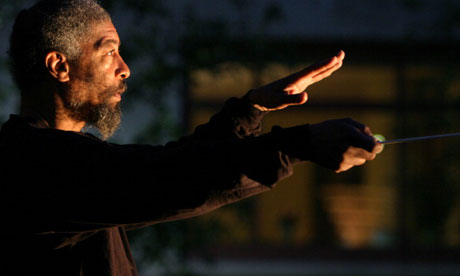
The globetrotting projects of the American composer Lawrence "Butch" Morris, who has died of cancer aged 65, drew on the talents of players from many backgrounds, including US and European jazz, Turkish sufi music, Japanese kabuki theatre, and classical music, dance and poetry. Morris described his approach as "an improvised duet for ensemble and conductor". Although he steered these encounters with a baton, his sign language was a homegrown technique he dubbed "conduction" – the definition of which has variously been given as a fusion of conducting and improvisation, and of combustion, ignition and propulsion. Morris staged more than 150 conductions (most of them simply entitled by their number in the sequence) in more than 20 countries in as many years.
His methods were a hybrid of conducting gestures borrowed from Horace Tapscott, Charles Moffett, Sun Ra, Lukas Foss and the electronics and computer composer Larry Austin. When he conducted a pedigree ensemble of British improvisers at the Southbank Centre in London in 1997, Morris revealed just how unusual this approach was. He would imperiously summon an explosively dissonant chord from the band in the midst of an intimate conversation between a few of the members, or coax a cellist into high, softly squealing sounds against the lilt of a harp – halting the impending intrusion of the others by admonishingly pointing to his ear, to suggest they should listen to the cello first. That 1997 performance was entitled London Skyscraper, and was one of several related Morris ventures in the mid-90s. Named after their locations – there were Bologna and Berlin Skyscrapers, among others – they used conduction techniques to take communications between musicians of diverse backgrounds even further.
Some improvisers considered Morris authoritarian – and flashes of irritation on his part could support that view. "I went into a first rehearsal with a classical orchestra once," he told me in 1997. "The minute I got through the door one of the trumpet players started playing jazz licks. I said, 'What are you doing?' He said, 'I like playing around with jazz. I thought you'd come to teach us jazz.' I said, 'I don't want what you like playing around with, I want what you care about most.' Nothing happened for a few days, then suddenly he started playing this fantastic trumpet stuff in an improvisation. 'What was that?' I said. He said 'Haydn.' 'Great,' I said, 'use it.' 'I can't,' he said. I told him by the time he'd deconstructed it, changed the phrasing around, used some notes and not others, nobody was going to know. That was the music he cared about, but used in a new way."
Born in Long Beach, California, Morris played trumpet at first and then concentrated on the cornet from the age of 14. He served as an army medic from 1966 – including a stint in Vietnam – and on his return to the US was introduced by his bassist brother Wilber to west coast free jazz.
Butch joined Tapscott's big band, studied music in Oakland, became associated with Moffett and the San Francisco new jazz scene and taught and played in France (recording with the saxophonist Steve Lacy), Belgium and the Netherlands from 1976 to 1981. Joining Wilber in David Murray's octet, his imaginative cornet playing evolved from a melodic, bebop-oriented style to a more abstract one, deploying a thin, tightly muted tone.
He began writing for Murray's band at the Knitting Factory club, playing on the 1980s New York "loft scene" alongside the guitarist Bill Frisell and the drummer Bobby Previte. His first conduction (entitled Current Trends in Racism in Modern America) was recorded at the Kitchen in New York in 1985 with an unorthodox band including John Zorn on saxophone, Christian Marclay on turntables and a harpist.
Morris's albums could sometimes sound more like news reports of rapidly unfolding events than coherent musical stories, but Burning Cloud (1993) was a rare showcase for both his subtle cornet playing and his creativity in a small ensemble. The 10-disc Testament (1995) represented the full range of his work, embracing music for voices, eastern instruments, European classical performers and free-improvisers.
Morris's conductions never made him self-sufficient economically. He directed the jazz ensemble for the Robert Altman film Kansas City (1996), and from 1998 to 2001 was a resident teacher at Bilgi University in Istanbul. He also wrote music for contemporary dance, briefly became musical director for the TV crime series A Man Called Hawk and composed for the theatre.
"Butch could lead a room full of musicians to unimagined and unparalleled places," wrote the trumpeter Dave Douglas. "It was nirvana for me to be a part of it; being in a swinging band is the pinnacle of belonging. It's like making something from nothing, a scaffolding built on a diverse community of musical language … I'll never forget how he bent to our needs and reimagined our sounds. And flashed thunderbolts as needed."
Morris, who was divorced from Therese Christophe, is survived by his son, Alexandre, brother, Michael, and sister, Marceline.
• Lawrence Douglas Morris, composer and cornetist, born 10 February 1947; 29 January 2013

